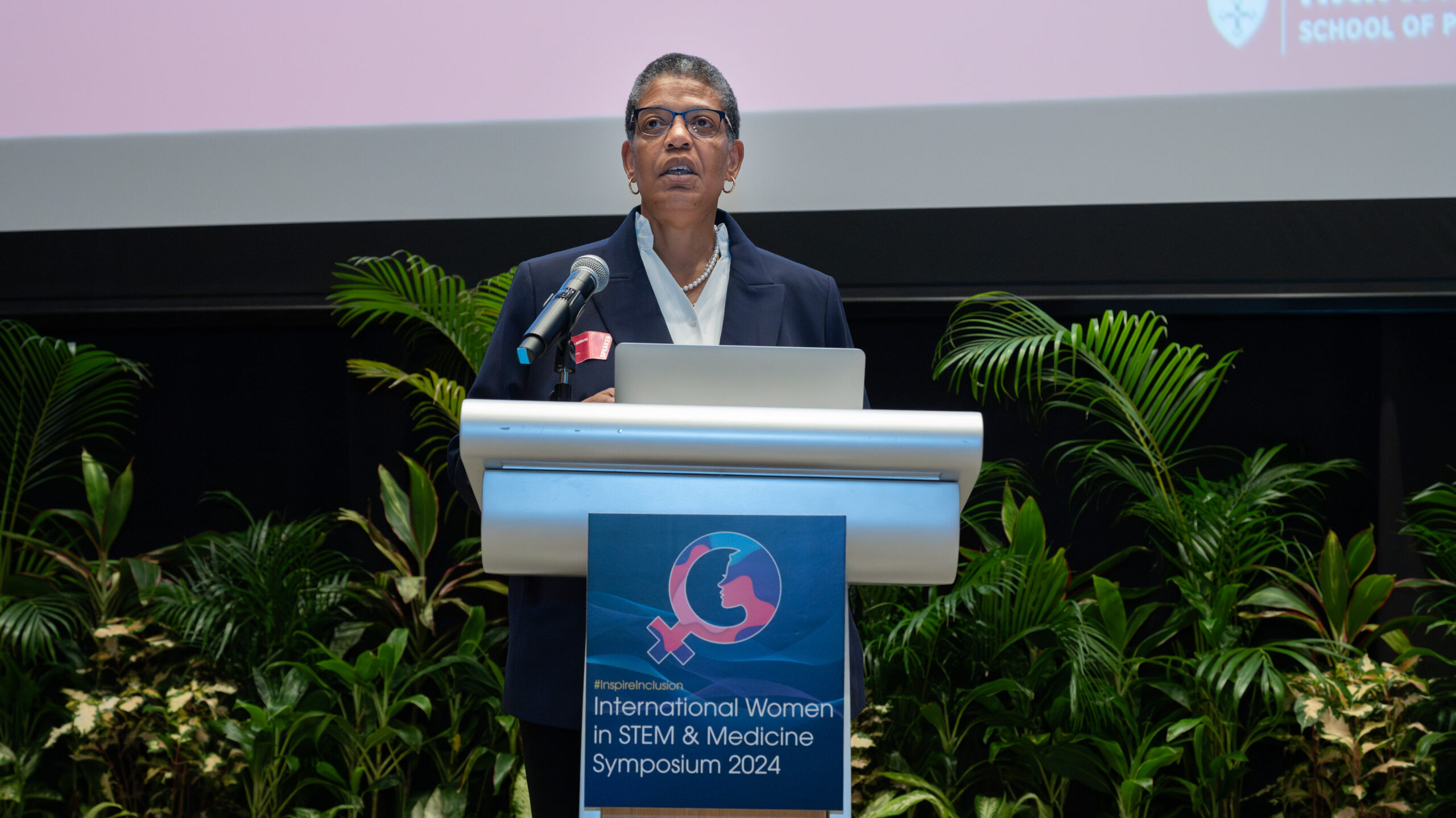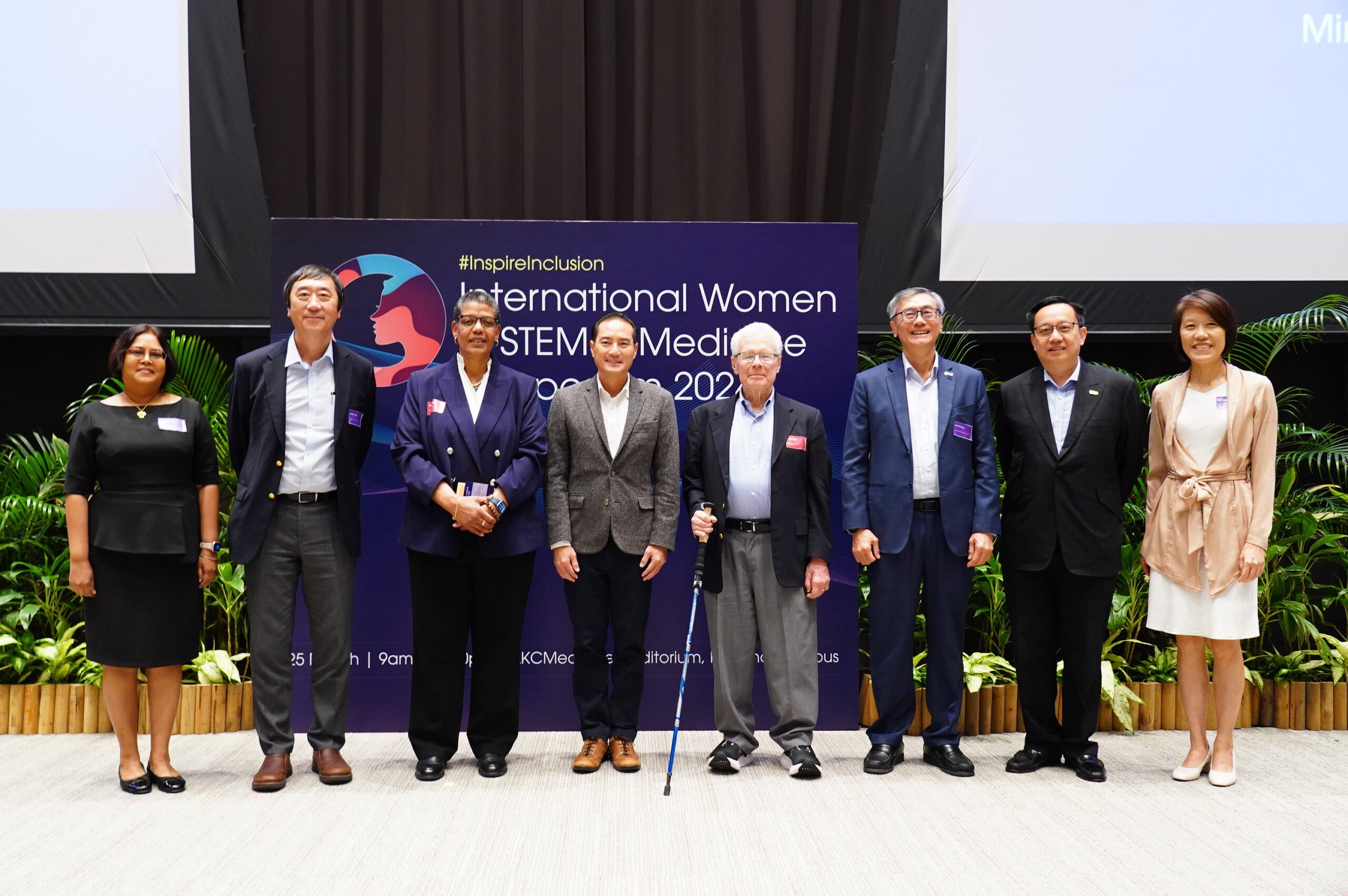Inspiring inclusion among women in science, technology, engineering, mathematics and medicine
Published: 05 Apr 2024

Prof Michelle Williams, Former Dean of Faculty, Joan and Julius Jacobson Professor of Epidemiology and Public Health, Harvard University, delivers keynote address, “Why is women’s health research and closing the equity gap important for all of us?”
Themed ‘Inspire Inclusion’, the International Women in STEM and Medicine Symposium 2024 was held on 25 March 2024 at the LKCMedicine Auditorium. Initiated in 2023, the symposium celebrates the achievements of these women professionals in Singapore and provides a platform to acknowledge the efforts of institutions and organisations in implementing equitable gender policies as a collective voice. The symposium seeks to inspire and encourage women in the medical, healthcare and science, technology, engineering, and mathematics (STEM) sectors to continue growing and excelling in their careers.
Guest-of-Honour, Mr Tan Kiat How, Senior Minister of State, Ministry of Communications and Information, delivered opening remarks on how the Government will continue to enable women to thrive in the workplace; nurturing and empowering future generations of women professionals in STEM fields; and on building an inclusive and supportive community.
In the opening keynote address delivered by Professor Michelle Williams, Former Dean of Faculty, Joan and Julius Jacobson Professor of Epidemiology and Public Health, Harvard University, she discussed why women’s health research and closing the equity gap are important for everyone. Highlighting the global lack of investment in women’s health, she revealed, “Women spend 25% or more of their lives in poor health. Since 2000, women in the US reported total adverse events from approved medicines 52% more frequently than men, and serious or fatal events 36% more frequently.” Adding on, she emphasised, “Women’s health is more than the absence of medical condition; it includes the ability to live on their own terms. There is a critical need for thoughtful action on the social determinants of health—including sufficient funding for women’s health research, equal pay, workplace flexibility and paid parental leave.” Analysing the projected gains from closing the women’s health gap, Prof Williams added that investing in women’s health research can potentially add at least $1 trillion to the global economy by 2040, and add 7 more days of healthy living for each woman annually. In fact, she cited, an investment of $1 in women’s health is estimated to yield approximately $3 in economic growth.
A prominent public health researcher and educator, known for her work in epidemiology and public health policy, she has led various initiatives aimed at advancing public health research, education, and practice globally. Prof Williams has published more than 520 scientific articles and was elected to the National Academy of Medicine in 2016. In 2020, she was awarded the Ellis Island Medal of Honour and recognised by PR Week as one of the top 50 health influencers of the year. Additionally, Prof Williams shared her thoughts on how platforms such as the symposium can nurture and empower future generations of women professionals.

From left: Prof Tulika Mitra, NUS Vice-Provost (Academic Affairs); Prof Joseph Sung, Dean, NTU LKCMedicine; Prof Michelle Williams, Former Dean of Faculty, Joan and Julius Jacobson Professor of Epidemiology and Public Health, Harvard University; Mr Tan Kiat How, Senior Minister of State, Ministry of Communications and Information; Prof Harvey Lodish, Massachusetts Institute of Technology; Prof Tan Eng Chye, NUS President; Prof Chong Yap Seng, Dean, NUS Medicine; A/Prof Gan Yunn Hwen, Assistant Dean, Equal Opportunities & Career Development, NUS Medicine. (Credit: Ministry of Communications and Information)
Together with Prof Williams, senior leaders, scientists and researchers from academic institutions and corporate organisations participated in a series of panel discussions on women’s health and development, sub-conscious gender bias that women face, and fostering equity and a culture of diversity in the workplace. This year’s edition of the symposium also introduced a new programme segment of breakout sessions, where participants engaged in deeper discussions with industry leaders on self-development, professional development and becoming ready for board leadership.
Prominent leaders and experts in their fields participating in the symposium include Professor Harvey Lodish, Massachusetts Institute of Technology; Ms Georgette Tan, President, United Women Singapore; Dr Mary Ann Tsao, Chairwoman, Tsao Foundation and Tsao Family Office; Professor Lisa Ng, Executive Director, Biomedical Research Council, A*STAR; Professor Cuilin Zhang, Director, Global Centre for Asian Women’s Health, NUS Medicine; and Dr Serene Ng, Chief Operating Officer, NTU LKCMedicine.
Panel discussion on women’s health and development. (From left) Ms Lindsay Davis, Founder, FemTech Association Asia; Dr Serene Ng, Chief Operating Officer, NTU LKCMedicine; Ms Anna Haotanto, Founder and Chief Executive Officer, Zora Health; Dr Rena Dharmawan, Consultant Surgeon, National Cancer Centre Singapore.
As the closing keynote address, Professor Harvey Lodish from the Massachusetts Institute of Technology, Founding Member, Whitehead Institute for Biomedical Research, shared about his journey in advising and mentoring female future scientific leaders and entrepreneurs over fifty-five years—where he created a family-friendly environment that helps to attract women to his lab. He is also a founder, co-founder and scientific advisory board member of several biotech companies, including Tevard, a company developing novel gene therapies for several genetic brain and muscle disorders; Cerberus, which develops novel protein- based therapeutics for autoimmune diseases and also protein-based vaccines for several viral infections; Carmine, which develops red cell extracellular vesicles as gene delivery vehicles; as well as Genzyme, Millennium Pharmaceuticals and Rubius Therapeutics. He shared that in later years, he realised that the bustling biotech industry had very few women as entrepreneurs or on the boards—an insight that inspired him to actively nurture female entrepreneurs.
Millennium Pharmaceuticals and Rubius Therapeutics. He shared that in later years, he realised that the bustling biotech industry had very few women as entrepreneurs or on the boards—an insight that inspired him to actively nurture female entrepreneurs.

Prof Harvey Lodish, Massachusetts Institute of Technology, and Founding Member, Whitehead Institute for Biomedical Research
Led by the Office of Equal Opportunities and Career Development (EOCD) at the Yong Loo Lin School of Medicine, National University of Singapore (NUS Medicine), the Women in Science and Healthcare (WISH) at the National University Health System (NUHS) and the Office of the Provost at NUS, the symposium is a collaboration with various women’s and diversity organisations in Singapore in the STEM and Medicine fields. These include SingHealth Duke-NUS WinS (Women in Science), United Women Singapore (UWS), Women in Science @ LKCMedicine, Women@NTU, Singapore Women in Science (SgWIS) and A*STAR Diversity Working Group.
A/Prof Gan Yunn Hwen, Assistant Dean, EOCD, NUS Medicine, said, “Empowering women’s health and development is important for the advancement of society as a whole. Through the symposium, we hope to foster deeper conversations aimed at nurturing women’s growth across all dimensions of life—not only in career pursuits, but also our holistic well-being. This will ultimately reap benefits to all, not just women.”
Watch the summary of the symposium’s highlights here.




